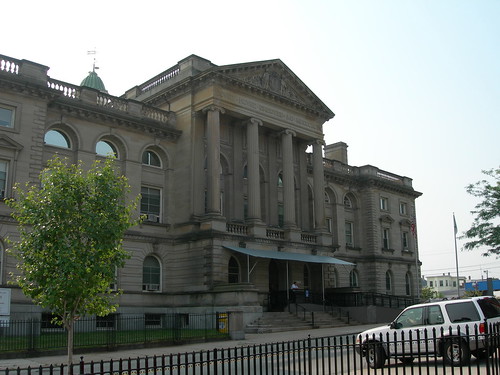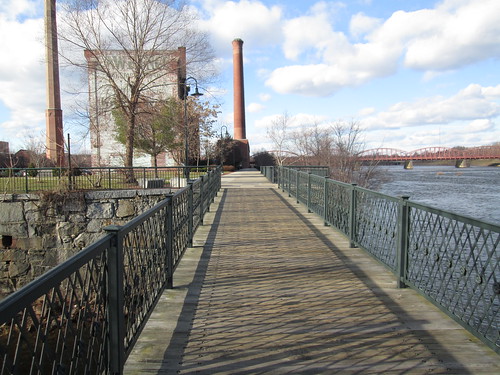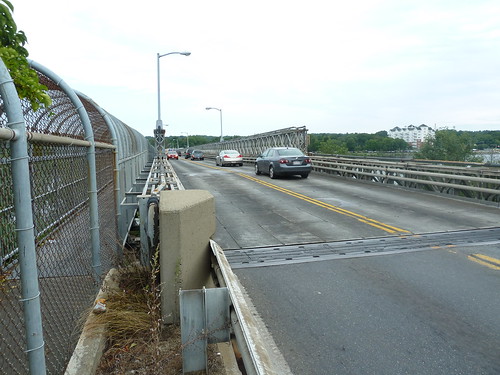Lowell Week in Review: May 14, 2016
Upcoming Council Meeting
The Finance Subcommittee will meet Tuesday night at 530pm to discuss the April year-to-date report on the FY16 city budget and also to discuss proposed FY17 sewer rates, which will include an increase that will be used to pay back money borrowed from the federal government for past sewer projects. The regular council meeting will follow the subcommittee meeting. There are a number of important reports, votes, and motions on the agenda, so I’ll use the rest of today’s article to highlight some of them.

Lowell Superior Courthouse, 360 Gorham St
Future Use of District and Superior Courthouses
In his response to a motion by Councilor Belanger on plans for the reuse of the Lowell District Court (on Hurd Street) and Lowell Superior Court (on Gorham Street) once the new judicial center opens, Manager Murphy writes that it is the responsibility of the state’s Division of Capital Asset Management and Maintenance and that it will be a complex and lengthy process that will begin when the state declares the two buildings surplus which will happen when the judicial center opens.
Five or so years ago, a new court facility was constructed in Worcester and the old Superior Court was vacated. The state was unable to find a private developer interested in the building and there was concern that it would be neglected and would deteriorate. That prompted the Lowell legislative delegation to host a series of meetings with DCAMM and interested local people on the process. Back then, DCAMM reps explained that once a building was declared surplus by the state, first choice for the reuse of the building would go to any other state agency; then to any city or other governmental agency; and only then would private developers be solicited through an open and public bidding process. The feeling back then was that either UMass Lowell or Middlesex Community College would try to acquire the District Court due to its proximity to other buildings operated by the two colleges. If not, the city might have interest in the building.
There was a different attitude towards the Superior Courthouse. It was difficult to envision it being reused by another governmental agency so the private ownership route would be most likely. I’ve said all along that the likelihood of bidders for the Superior Courthouse will depend on the state of the real estate market at the time. With its onsite parking, its proximity to the Lowell Connector, the South Common, and the Gallagher Terminal as amenities, the building would make an attractive residential condominium or apartment building. But given the interior layout, it would be a costly conversion for any developer.
Even though the formal state process may not begin for several years, it is wise for the city to draw attention to these two buildings now. They both are valuable properties in strategic locations that present challenges for redevelopment. No point in waiting until the last minute to start talking about it.
Proposed Private Dormitory on Lowell Five site
The council agenda states that Vision Development Inc. Of Conshohocken, Pennsylvania, will make a presentation to the council on Vision’s plans to build a private dormitory at 1 Merrimack Plaza, the former Lowell Five/Fred C. Church site on French Street Extension, across from Lowell High School. (This project was supposed to go before the Conservation Commission last week but it was continued to the commission’s May 25 meeting).
According to the Special Permit Narrative available on the city’s website, Vision hopes to construct a five-story, “438 bedroom” building on the 2.25 acre site to be used as housing for college students. The narrative states
There is a paucity of good student housing at the Lowell colleges. Many of the student housing units that do exist lack adequate amenities. The proposed student housing will provide lounges, a computer room, a gaming room, meeting rooms, a study hall, as well as support services. Since each living unit has a kitchen, the students can enjoy economical meals and not have to dine out. The overall expense of room and board will thus be economical in comparison to many of the alternatives. Rather than having the students spread out in various apartments throughout the region, they will be able to be integrated into this housing community which will provide programs, support services and allow the diverse student population to interface and grow.
The proposal provides no on-site parking (other than two handicap spaces), however, the city has agreed to make available up to 180 city parking garage passes for residents of the building (either at market parking rate or with a group discount). The proposal also downplays the need for private vehicle parking, stating that “the vast majority” of trips to and from this building will be by “University shuttle buses, LRTA buses, by bicycle, or by walking.
I’d be interested to learn UMass Lowell’s position on this project. I believe the previous Chancellor, Marty Meehan, opposed a similar project on this same site. I’m not sure whether circumstances have now changed at the University or if this developer has decided to go forward whether the University supports it or not.
Aside from my curiosity about the University’s position on this project, it sounds pretty good. We want Lowell to be more of a “college town” so bringing a residence for college students to this location would help do this. Residents of this building would be naturally drawn to the restaurants and businesses on Merrimack Street and vicinity. One “challenge” I would envision for those who reside in this building would be getting the food that they are supposed to be cooking in their in-unit kitchens. The closest grocery store to this site is the Market Basket at Fletcher and Broadway. That’s a pretty good walk, even when you’re not carrying a week’s worth of groceries.

Lowell Riverwalk
One huge benefit of this project could be drawing more people to the Riverwalk. That pathway along the south bank of the Merrimack River runs from Bridge Street to University Ave. It’s a beautiful, picturesque walk, but shortly after it opened, a woman jogger was brutally assaulted on it and I think the community has never forgotten that. Any time I’ve been on the Riverwalk, other people are few and far between. The most effective way of making the Riverwalk safer, both conceptually and in reality, is by adding a lot more people to it. I could see residents of this building bound for the East or North Campuses of UMass Lowell, gravitating to the Riverwalk because of its beautiful scenery and the absence of motor vehicles.

Rourke Bridge
Rourke Bridge
At last week’s city council meeting, Councilors Samaras and Belanger had a joint motion that raised the issue of a replacement for the Rourke Bridge. Samaras explained that at a recent meeting, the state Secretary of Transportation remarked that a new Rourke Bridge is not a priority project for the Commonwealth. The councilors spent quite a bit of time discussing how to change that. I understand that Mayor Kennedy and representatives from the city’s Division of Planning and Development testified the following night at a MassDOT (Massachusetts Department of Transportation) public hearing in Andover, and that the city’s statehouse delegation are addressing this with state officials.
This week, there is another joint motion, this one by Mayor Kennedy and Councilors Samaras and Belanger that the city council “approve a resolution requesting MassDOT include the monies necessary for an environmental study for the Rourke Bridge in the state’s FY17 Capital Plan and request Northern Middlesex Council of Governments (NMCOG) approve a similar resolution and have Councilor Belanger (the city’s representative on NMCOG) invite representatives from Dracut, Chelmsford, Tyngsboro, and other surrounding communities to submit similar resolutions.”
I think the city has a strong argument in favor of the state making the Rourke Bridge replacement a higher priority. I certainly don’t believe that widening the bridge would magically make traffic disappear, but even with that caveat, the bridge could be much better than it is, both for motor vehicles and for bicyclists and pedestrians, who currently share a caged-in walkway latched onto the upriver side of the bridge that is barely three feet wide. It’s tough to argue that more people should be walking or bicycling when their only alternative is such an awkward, uncomfortable pathway. Presumably a new bridge would make the pedestrian and bike ways safer and more rational. And widening the bridge for vehicular traffic would at least make it easier for emergency vehicles to swiftly make it across at peak traffic times.

Pedestrian & Bicyclist path across Rourke Bridge (one side only)
Then there is the economic development component. One of the city’s biggest private employers, Lowell General Hospital, sits on the north side of the river, midway between the Rourke and O’Donnell Bridges. Another potentially huge employment complex, Cross River Center at 1001 Pawtucket Blvd (the old Wang then MA/Com facility) sits just west of the Rourke Bridge. Farley White Interests has made a big investment in Lowell by purchasing that building (which has more square footage of space than the three Cross Point towers combined). The city should make every effort to improve the infrastructure that services both LGH and Cross River Center, and replacing the Rourke Bridge would be a big step in that direction.
If Boston had gone forward with the 2024 Olympics, there is no doubt that the replacement of the Rourke Bridge would already be in the state’s planning pipeline. Improving the efficiency of two major city employers and the quality of life of thousands of those who live north of the river, seems like as good a reason as the Olympics to do this project.
Transgender Accommodations
Councilors Elliott and Mercier have a joint motion requesting the City Council “vote to adopt a resolution to oppose the transgender bill adopted by the State Senate which allows access to women’s bathrooms and locker rooms.”
Here is the full text of the bill, Senate 735, “An Act relative to transgender anti-discrimination:”
SECTION 1. Section 92A of chapter 272 of the General Laws, as so appearing in the 2012 Official Edition, is hereby amended by inserting after the word “sex”, in line 9, the following words:- , gender identity.
SECTION 2. Said section 92A of said chapter 272, as so appearing in the 2014 Official Edition, is hereby further amended by inserting the following sentence at the end of the second paragraph:-
Any public accommodation including without limitation any entity that offers the provision of goods, services, or access to the public that lawfully segregates or separates access to such public accommodation or other entity based on a person’s sex shall grant all persons admission to and the full enjoyment of such public accommodation or other entity consistent with the person’s gender identity.
SECTION 3. Section 98 of said chapter 272, as appearing in the 2012 Official Edition, is hereby amended by inserting after the word “sex”, in line 2, the following words:- , gender identity.
SECTION 4. The term gender identity as used herein shall have the meaning as set forth in clause 59, Section 7 of chapter 4 of the General Laws, as appearing in the 2014 Official Edition.
SECTION 5. The Massachusetts Commission Against Discrimination, established by section 56 of chapter 6, is authorized to adopt, promulgate, amend, and rescind rules and regulations or to formulate policies and make recommendations to effectuate the purposes of this Act.
The Senate voted 33 to 4 in favor of this bill. Eileen Donoghue and every other Senator representing a town that touches Lowell, voted in favor of this bill. I agree with Senator Donoghue’s vote in favor of this bill and I hope when an almost identical bill comes before the House, our state representatives – Tom Golden, Dave Nangle, and Rady Mom – also support it.
And I hope the other seven councilors defeat this motion.
With the expansion of MA/Com, the arrival of Kronos and the Markley Group, and all of the exciting work being done at the UMass Lowell Innovation Center, Lowell is rapidly becoming a center of high tech. These businesses and others form a solid foundation in the innovation economy and will only attract similar companies and startups. Yet the people who run these companies, and the people who will be working at them, will not want to come to a community that takes a backwards, irrational view of transgender rights. That is why so many companies have cancelled plans to relocate to or expand in North Carolina which with its “research triangle” had been a leading high tech region.
This motion urging defeat of the transgender rights bill also jeopardizes Lowell’s efforts to become a college town and to continue to grow as a home for artists. Both of those groups, college students and artists and all those drawn to them, want a community that is welcoming to everyone and that is open to change and new ideas. In fact, every economic development strategy pursued and being pursued by this city will be undercut by the passage of this motion.
More importantly, depriving the protection of the law to transgendered individuals is just wrong. The arguments against this bill have no basis in reality and are the product of prejudice and ignorance. This is much like what happened back in 2003 when the Supreme Judicial Court allowed same sex marriage. Those who opposed that decision predicated it would lead to bigamy, bestiality, and countless other ills. They were wrong then, just as the opponents of this bill are wrong now. The legislature should pass this bill, the governor should sign it, and we should let everyone get on with their lives. Instead of voting to oppose this measure, the Lowell City Council should pass a substitute motion endorsing it.
Thanks for all the care and time you put into these week-in-review posts. I feel like I have a sense of Lowell happenings even after moving far away.
I appreciate your thoughtful articulation about the state transgender rights bill re: two Councilors regrettably proposing that Lowell resolve in opposition. I too hope a substitute motion to endorse the bill is passed. I shall stay tuned to future week in review posts. :)
With respect to the student housing, I am pretty sure that the problem with the earlier proposal is that UML would not use student stipends to fund off-campus housing. It sounds like the current proposal recognizes that, yet is still willing to proceed, although they may be hoping for a reversal of the UML position.
Aurora Erikson has an excellent follow-up with action-suggestions in her latest post…. https://learninglowell.wordpress.com/2016/05/15/city-council-motion-against-transgender-anti-discrimination-act/
Dick,
I don’t agree with your reasoning for building a new Rourke bridge. I too am a big proponent of walking and biking as transportation. I’d argue that most folks that cross the current bridge do so for recreational purposes. Widening the bridge might make it better while on the new bridge but once at the new intersections it will surely be more dangerous and less likely non-vehicle usage will rise.
Ignoring that widening the bridge will induce sprawl and more congestion in both Pawtucketville and the Highlands is blindly optimistic. Can Mammoth Rd and Univ Ave handle more traffic? Don’t you agree that the “horse” land for sale next to the Stonehedge Inn and others like it will instantly spawn huge condo complexes? Tyngsboro is desperate for growth. Why give it to them when in the long run they won’t have the money to maintain it? Do we need more Dunkin Donuts or CVS’s on the boulevard?
Ambulances have sirens for a reason. Widening streets is the type of thinking that led to the decline of St Josephs and St Johns hospitals. Would widening the bridge make it more of a target for outside hospitals to buy it? That certainly wouldn’t be good for Lowell.
If development of land up river is bad for flooding should’t the people in the Rosemont neighborhood be worried?
Fixing one “problem” opens up a host of new ones. Let’s make downtown Lowell so damn walkable and bikeable that development moves from there outward. That’s how Lowell thrived in the past and can again.